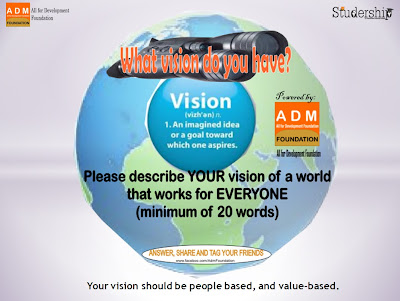Last week was incredibly amazing!
 The week started with an online engagement with participants of the Studership 2.0 Leadership Programme – emerging leaders from 38 countries in five continents (Africa, Asia, Europe, North America and South America). It is believed that young people are the greatest assets of any nation, and our contribution to personal and global development is quintessential. As leaders however, we need to clarify, and identify where we stand, as we continue in the voyage of leadership, personal and global development.
The week started with an online engagement with participants of the Studership 2.0 Leadership Programme – emerging leaders from 38 countries in five continents (Africa, Asia, Europe, North America and South America). It is believed that young people are the greatest assets of any nation, and our contribution to personal and global development is quintessential. As leaders however, we need to clarify, and identify where we stand, as we continue in the voyage of leadership, personal and global development.
In the realm of leadership study, questions of nature versus nurture of leaders have always been one of the frequently asked questions. In a similar vein, we asked ‘Are Leaders Born or Made?’, creating a poll with the options of ‘Leaders are Born’, ‘Leaders are Made’, and ‘Leaders are Born and Made’. After a thoughtful and enlightening session of conviction and explanation of diverse opinion, 12.9% of respondents opined that leaders are born, 16.13% opined that leaders are made while 70.97% of participants chose that leaders are born and made.
Personally, i believe that though the circumstance surrounding birth and upbringing may influence ‘certain traits’, leaders – depending on the context of definition of leaders – are born and made. Everyone has a potential for growth, if provided with the right resources, platform and unwavering commitment. The major difference between those born to occupy certain leadership/royal position and great leaders is the continuous self awareness and commitment to growth.
In furtherance of the concept behind this discuss, we advised – during our first broadcast held later in
the week - that as leaders, it is essential we have a vision. Theodore Hesburgh had advised that ‘the very essence of leadership is that you have to have a vision’, a vision that is people-based, value-based and creates a mental illustration (picture) of a world that works for everyone – an illustration which you can clearly articulate in every situation. Apart from having a vision, another step to developing the leader in you is that you need to seek clarity on your values. Identify and live your life by core values; you may make a commitment to live by the values of integrity, responsibility, credibility, appreciation, 'exemplarity', among others.
To make this easy - but not easier – you may decide to start by writing an ‘ideal’ tribute to yourself; write the way you want to be seen by people, how you want your generation to see you, what you want history to record about you. Second, discover your ‘real’ self; be faithful to know where you are and where you stand. Understand who you are, what your passion is and where your strengths lie. Note the difference between WHO you are currently and who you aspire to be – as written. Third, make an action plan. Write your credo and stick to it.
Now the big questions; how conscious are you about yourself? Are you committed to your personal growth? Can you state your vision of a world that works for everyone? Are you living by your core values?
I’ll love to read from you.
Keep Growing, Keep Leading!
__________
Aanu Damola Morenikeji is considered Africa’s youngest youth intellectual and leadership development advocate. A sought-after speaker on the theme of leadership and personal growth, he is an alumnus of the M121 Social Leadership Academy, U.S.A and founder of Studership Youth Leadership Academy – an initiative of All for Development Foundation [ADM-Foundation]. He blogs at www.admnigeria.blogspot.com and can be reached via damolamore@gmail.com.


















